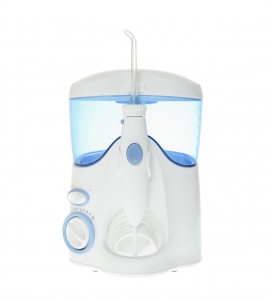
Using a Water Flosser
Water flossers, also called water picks, are oral irrigation tools. These tools administer pressurized water or jet streams to remove food particles from the between your teeth, as well as from pockets under the gum. Water flossers are usually electric and connect to a water reservoir. Some electric toothbrushes even contain a water flossing function.
Whether or not you should completely replace ordinary flossing with a water pick depends on the shape of your teeth and gums. It may be worthwhile if you have sizable gaps between your teeth or deep gum pockets that require cleansing. Some foods escape the oral irrigator’s action. You can try using an interdental brush, or floss after using a water pick, to examine a water flosser’s overall effectiveness. In any case, water flossers can absolutely be applied as an addition to your routine. Speak to our Auburn dentist, Dr. Matson, for more suggestions.
Is Oral Irrigation Right for Me?
When may our Auburn dentist suggest using a water pick? Here are some specific situations where such a tool is useful:
- Bleeding Gums: The primary cause of bleeding gums is gum disease, a bacterial infection needing assistance from your dentist. If you are under treatment for gum disease, and find that many areas continue to bleed despite regular flossing, a water pick may help address the issue.
- Braces: For those with braces, little is more irritating than food stuck between your teeth. Without proper cleaning, that food leads to tooth decay. A water pick used between meals removes food particles, in conjunction with complete brushing and even an interdental cleaner.
- Dry Mouth: Saliva is the body’s natural cleaning agent, also saving enamel against the development of dental plaque. Dry mouth, a condition in which the mouth produces a lower quantity of saliva than average, can increase the risk of gum disease and developing cavities. Although not a long-term cure, a water pick increases moisture to your mouth while removing bacteria, plaque and food particles.
Doctors show that oral irrigation tools are safe and effective for diluting the acids produced by oral organisms, and to address the situations considered above. If you’re interested in using one of these tools, mention it to a member of Rock Creek Dental at your next exam and we’ll make a suggestion that’s best for your circumstances.
Schedule Your Appointment